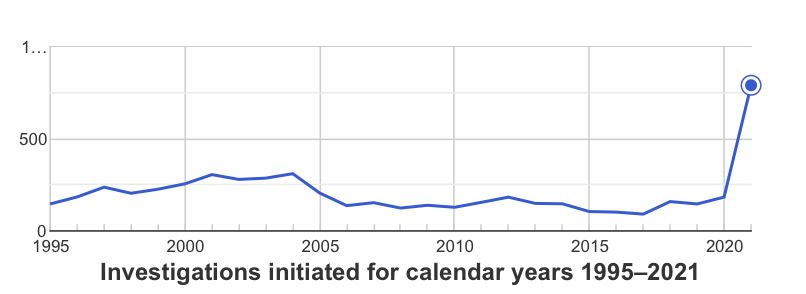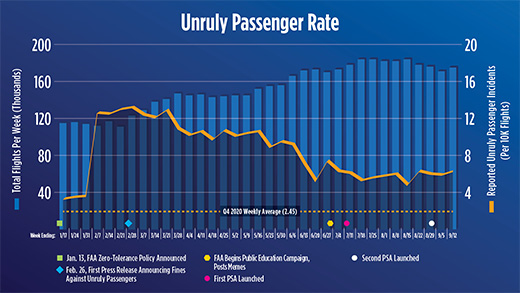The skies are as unfriendly as they’ve ever been.
This week the Federal Aviation Adminstration (FAA) reported 4,385 instances of unruly passengers on commercial flights so far this year. Of those, 3,199 were related to wearing a face mask, now required on all flights by law to curb the spread of Covid-19. However, those numbers are only ones reported to the FAA. They’re likely much higher, as it’s up to flight crews to report the incidents.

On Thursday, the U.S. House Subcommittee on Aviation reviewed the issue of what government officials call “air rage.” The hearing was set to examine examine the ”alarming increase” in disruptive airline passengers, the causes of “air rage,” its effect on passenger and crew safety, and the enforcement of U.S. laws against it.
So far, the FAA has investigated 755 air rage events and brought 154 law enforcement cases against unruly passengers. The FAA can propose a fine of up to $37,000 per violation in unruly passenger cases, and an incident can involve multiple violations.

In testimony Thursday, Teddy Andrews, a flight attendant and member of the Association of Professional Flight Attendants, told lawmakers one incident made him reconsider his career choice. On a flight, he approached a passenger who refused to wear a mask.
“He looked at me, and here I will not repeat the vile epithet he used, he said, ’N*****, I don’t have to listen to a damn thing you say, this is a free country,’” Andrews said. “I was completely taken aback. I didn’t know what to say. Then he continued, ’You heard me, N***** boy.’”
“He said, ’N*****, I don’t have to listen to a damn thing you say.'”
Testimony of Teddy Andrews, flight attendant
The man eventually put his mask on, but not before Andrew reminded him that failing to comply with flight rules could restrict his ability to fly the airline in the future.
Sara Nelson. a flight attendant and president of the Association of Flight Attendants-CWA, AFL-CIO (AFA), said, “these numbers are staggering and if they continue at this rate may result in more incidents in 2021 than the entire history of commercial aviation.”
A recent union survey of flight attendants found the number of incidents is likely way higher. Of the 5,000 flight attendants polled in June and July, 85 percent of them reported an incident with an unruly passenger — 58 percent of those reported at least five incidents.

“Flight attendants reported facing extensive verbal abuse, including from visibly drunk passengers, passengers yelling and swearing in response to masking directions, and often aggressively challenging flight crew working to ensure compliance with federal rules,” Nelson said. “Many respondents recounted aggressive incidents, including shoving, kicking seats, throwing trash at flight crew, defiling the restroom in response to crew member instructions, and following flight crew through the airport to continue yelling and harassment.”
U.S. Rep. Steve Cohen (D-Memphis) asked Nelson if the survey results yielded any information on the demographics of unruly passengers, like race, age, or residence. Nelson did not have specifics but noted that passengers were more likely to anger over face mask rules in regions where masking policies were not consistently communicated or where there was “very clear opposition to masks.”
“We have had a lot of incidents out of Charlotte,” Nelson said. “We’ve had a lot of incidents out of Florida airports and out of Texas. I’m not saying there aren’t incidents out of other places at all. But there are seems to be a higher concentration [in the South].”
Cohen also explored the connection between alcohol and unruly passengers. He said restaurants in the Charlotte airport will close at around 7 p.m. but the “alcohol places” will stay open until the last flight leaves.
“Why in the hell will they not give you food but they’ll give you alcohol,” Cohen asked.
Christopher Bidwell, senior vice president of security with Airports Council International, said he was not familiar with policies in the airport. Cohen answered his own question, guessing “it might be profit margin. It might be they don’t give a hoot. But the areas where they sell alcohol are packed and the people are fairly rowdy.”
